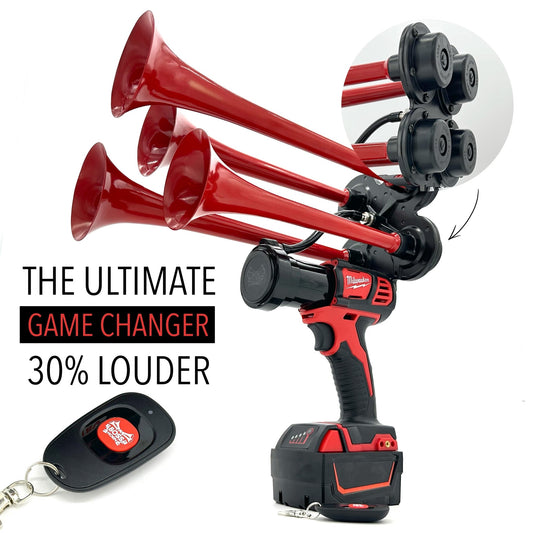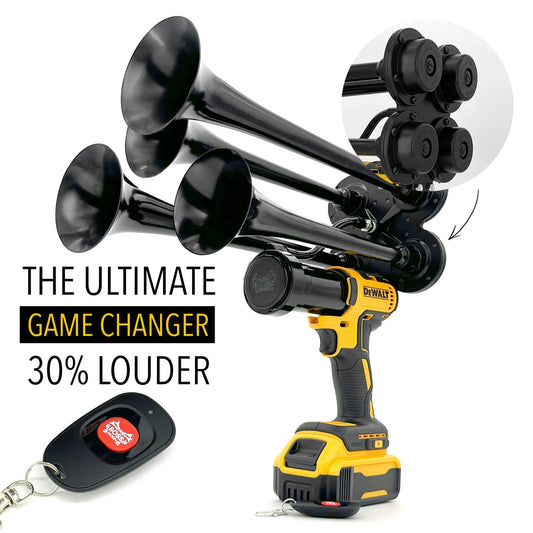According to a recent study conducted by the National Highway Traffic Safety Administration, excessive noise pollution from vehicles is a major concern in residential areas across the country. The excessive use of horns in neighborhoods has become a common source of irritation and frustration for residents.
The tradition of using horns to communicate while driving dates back to the early 1900s, when automobiles first became popular. Over the years, horns have evolved from simple hand-operated devices to electrically powered horns that emit loud sounds to alert others of a driver's presence. While horns serve an important safety function on the road, their misuse in residential areas has led to an increase in noise complaints and disturbances.
One solution to reduce noise pollution in residential neighborhoods is to educate drivers on the proper use of horns. Drivers should be reminded to limit horn use to emergency situations or when necessary to avoid a collision. Excessive honking not only disrupts the peace and quiet of a neighborhood, but it can also contribute to increased stress and anxiety among residents.
In addition to educating drivers, local authorities can also play a role in addressing noise pollution from vehicles. By enforcing noise ordinances and issuing citations to drivers who misuse their horns, communities can work together to create a more peaceful and harmonious living environment for all residents. With awareness and enforcement efforts in place, the negative impact of horn usage in residential areas can be significantly reduced.
< h1>Is it appropriate to use a car horn in a residential area?
Using a car horn in a residential area can be a contentious issue, as it may disturb the peace and tranquility of the neighborhood. However, there are situations where using a car horn may be necessary for safety reasons or to alert other drivers of your presence. In the following section, we will discuss the etiquette surrounding the use of car horns in residential areas and provide guidance on when it is appropriate to use them.
Residents in many communities often face the dilemma of whether or not to use their car horns within residential areas. There are a variety of factors to consider when deciding whether to sound your car horn in a residential area, including the time of day, the reason for honking, and the potential impact on the surrounding community.
Considerate Use of Car Horns:
- It is important to remember that car horns are intended to be used as a safety feature to alert other drivers or pedestrians of a potential danger.
- Using your car horn excessively or unnecessarily can be disruptive to the peace and quiet of a residential neighborhood.
- Before honking your horn, take a moment to consider whether it is truly necessary and if there are any alternative ways to communicate with other drivers or pedestrians.
Time of Day:
- One important factor to consider when deciding whether to use your car horn in a residential area is the time of day.
- Avoid honking your horn late at night or early in the morning, as this can disturb residents who are trying to sleep.
- Be mindful of the noise level of your surroundings and consider whether your car horn will disrupt the peace and quiet of the neighborhood.
Reasonable Circumstances:
- There are certain situations where it may be necessary to use your car horn in a residential area, such as to alert other drivers of an impending collision or to warn pedestrians of your presence.
- In these cases, it is important to use your car horn in a considerate and measured way to prevent unnecessary noise pollution.
Community Impact:
- Excessive use of car horns in a residential area can have a negative impact on the overall quality of life for residents.
- Noise pollution from car horns can contribute to stress and anxiety among residents, and may even affect property values in the neighborhood.
Statistics:
- According to a study conducted by the Environmental Protection Agency, noise pollution from car horns is a significant concern in many urban areas.
- In a survey of residents living in neighborhoods with heavy traffic, 65% reported being bothered by excessive honking of car horns.
- Over 50% of residents in these neighborhoods reported that noise pollution from car horns affected their quality of life and overall well-being.
https://youtube.com/watch?v=nEIwZl2fmGo
Can I use my car horn in a neighborhood setting?
Yes, you can use your car horn in a neighborhood setting, but it is important to be mindful of when and how you use it.
1. Use your car horn only in emergency situations to alert others of danger.
2. Avoid using your car horn excessively or unnecessarily, as it can disturb and annoy residents.
3. Remember to exercise caution and use your horn sparingly to maintain good relations with your neighbors.
When is it appropriate to honk my car horn in a residential area?
It is appropriate to honk your car horn in a residential area in emergency situations or to alert others of potential danger.
1. Use your horn when you need to warn others of a potential collision or hazardous situation.
2. Avoid honking your horn to express frustration or impatience, as this can create tension and disturb the peace.
3. Prioritize safety and considerate use of your horn in residential areas to promote a harmonious environment.
What are the consequences of excessive car horn usage in a residential area?
Excessive car horn usage in a residential area can lead to complaints from neighbors, potential legal repercussions, and strained relationships within the community.
1. Excessive car horn usage can disturb residents and lead to complaints to local authorities.
2. Continued violation of noise ordinances related to car horn usage can result in fines or legal action.
3. Strained relationships with neighbors can occur due to excessive noise pollution from frequent horn honking.
How can I minimize noise pollution in a residential area while still using my car horn when necessary?
You can minimize noise pollution in a residential area by using your car horn sparingly and only when necessary, as well as taking other measures to reduce noise impact.
1. Use your horn only in emergency situations or to alert others of potential danger.
2. Consider alternative methods of communication, such as using your voice or hand signals, instead of relying on your car horn.
3. Be mindful of noise levels and the impact of your actions on the residential community to maintain a peaceful environment.
What can I do if my neighbors complain about my car horn usage in a residential area?
If your neighbors complain about your car horn usage in a residential area, it is important to address their concerns respectfully and take steps to minimize noise disruption.
1. Apologize to your neighbors for any inconvenience caused by your car horn and assure them that you will be more mindful in the future.
2. Consider adjusting your driving habits and using your car horn only in emergency situations to alleviate noise concerns.
3. Open a dialogue with your neighbors to discuss potential solutions and work together to create a more peaceful living environment.
Overall, it is important to be conscientious of how and when you use your car horn in a residential area to promote a harmonious community environment. By following guidelines for considerate horn usage and minimizing noise pollution, you can help maintain positive relationships with your neighbors and contribute to a peaceful living environment.
Conclusion
Overall, it is important to be courteous and mindful when using your car horn in a residential area. Only use it when necessary, such as to alert others of danger or to prevent an accident. Avoid using the horn as a form of communication or out of frustration, as it can disturb the peace and tranquility of the neighborhood. Remember that residents have the right to a quiet and peaceful environment, so be respectful and considerate when using your car horn in a residential area.














